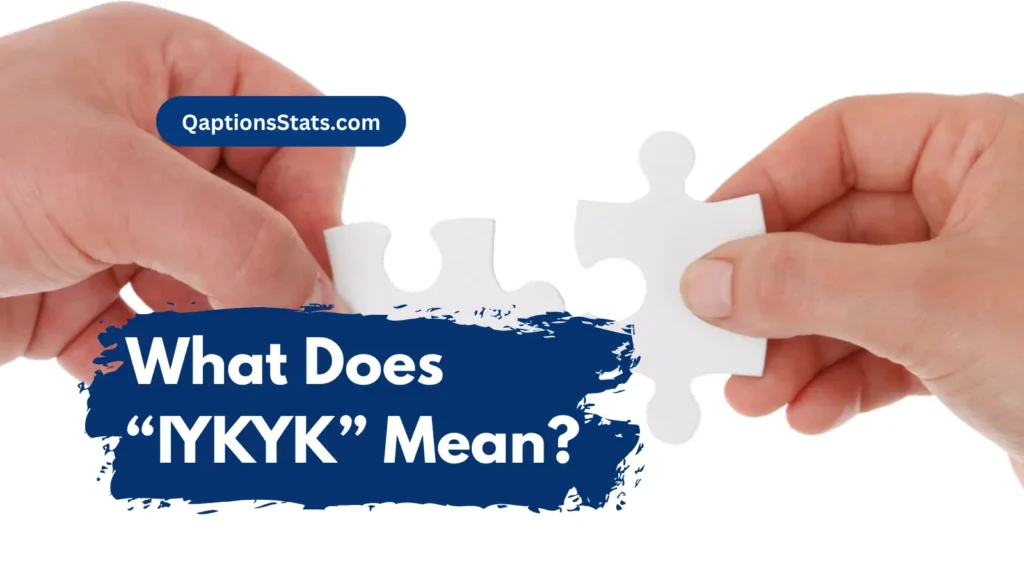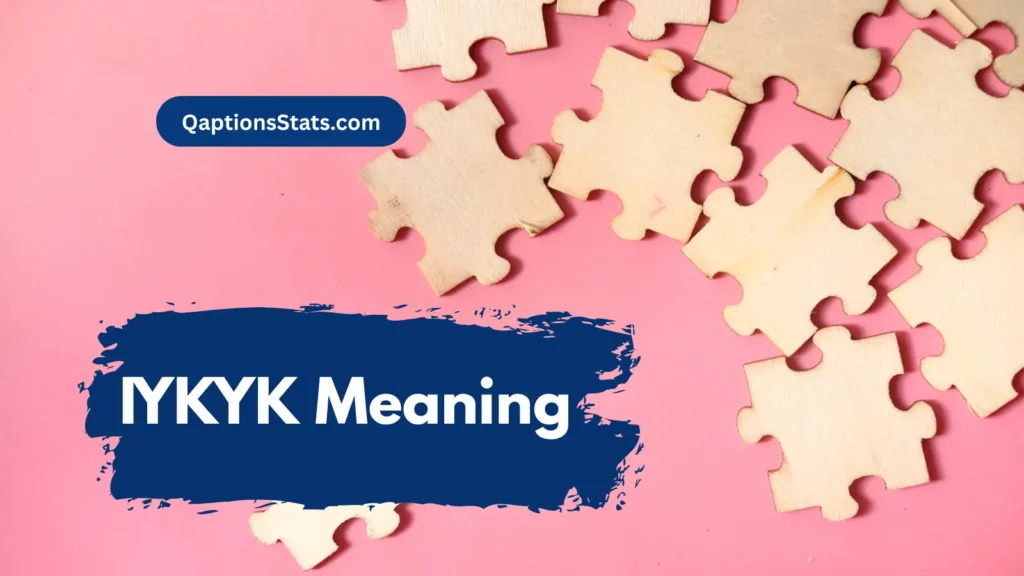Language constantly evolves. With the rise of the digital age, new acronyms, phrases, and expressions have emerged—terms like “IYKYK” and “hiatus” now dominate casual conversations and online content. However, for many people, especially those less familiar with social media or informal English, these phrases can seem like a code.
In this complete guide, we will break down the meaning of “IYKYK” and “hiatus,” explore their origins, real-life examples, and polite alternatives, and show you how to use them naturally in conversation.
By the end of this article, you will not only understand these phrases, but you’ll also know when and how to use them effectively based on context, tone, and purpose.
What Does “IYKYK” Mean?

“IYKYK” stands for “If You Know, You Know.” This phrase is used when someone is referring to something that only people who are familiar with the subject will understand. It adds a layer of mystery, exclusivity, and insider knowledge.
It can be used for jokes, memories, music lyrics, memes, locations, or niche communities.
Related Post: Kroner Meaning Explained: Full Guide to Currency and Usage
Origins of “IYKYK”
The longer version, “If you know, you know,” has been around for decades in spoken English. It expresses that some experiences or ideas can only be understood through personal familiarity. But the acronym “IYKYK” started gaining traction in the mid-2010s, especially in online communities and on platforms like Twitter, Instagram, and TikTok.
By 2018, it had become viral, particularly after being used in captions and tweets referencing personal stories, celebrity gossip, or meme culture. It quickly became a symbol of relatable humor and niche knowledge.
When Do People Use “IYKYK”?
Let’s consider a few common situations:
1. Referencing an Inside Joke:
- “Remember what happened at Jake’s party last night? IYKYK.”
2. Mentioning a Hidden Spot:
- “This little café has the best espresso in town. IYKYK.”
3. Talking About a Personal Experience:
- “That feeling you get when you finish a marathon. IYKYK.”
4. Referring to a Memorable Moment:
- “The final scene in that movie? IYKYK.”
This phrase works without having to explain too much. It assumes the other person either shares the knowledge—or is left wondering.
Tone and Style: How to Use “IYKYK” Properly
“IYKYK” is typically informal, and it works best in digital settings such as:
- Text messages
- Social media posts
- Meme captions
- Blog comments
- Private chats
It’s not ideal in professional writing or formal documents. However, in branding or modern content marketing, it can be used playfully if your audience is youth-oriented or social media-savvy.
Read Also: 1111 Meaning: Angel Number 1111 and the Concept of Hiatus
Polite and Professional Alternatives to “IYKYK”
While “IYKYK” has its charm, it’s not always suitable—especially in formal settings or respectful interactions. Let’s explore polite ways to express a similar idea.
1. “Only those who’ve been there will understand.”
- Example: “Running a startup from scratch is a unique journey. Only those who’ve been there will understand.”
2. “It’s one of those things you have to experience.”
- Example: “Being a parent changes everything. It’s one of those things you have to experience.”
3. “Some things are better left unsaid.”
- Example: “The way he handled that situation… Some things are better left unsaid.”
4. “Words can’t do it justice.”
- Example: “The sunset over the cliffs was breathtaking. Words can’t do it justice.”
These alternatives maintain a similar feeling of exclusivity or depth without sounding too casual or cryptic.
The Meaning of “Hiatus”
Unlike “IYKYK,” which is playful and trendy, “hiatus” is a formal and neutral English word used in various professional and creative contexts.
Definition:
A hiatus is a temporary pause or break in an ongoing activity, series, or routine. It doesn’t mean the end—it simply indicates an interruption with the intention to resume.
See Also: WYLL Meaning and Hiatus Explained Simply
How Do We Use “Hiatus” in Daily Life?
Let’s examine its usage in different areas:
1. In Entertainment:
- “The band is on hiatus while members pursue solo careers.”
- “The show went on hiatus after Season 3.”
2. In Work and Careers:
- “After five years of nonstop projects, she’s taking a hiatus to focus on her health.”
3. In Education:
- “I’m on a hiatus from university this semester due to personal reasons.”
4. In Creative Endeavors:
- “The artist announced a hiatus from painting to explore photography.”
5. In Social Media:
- “Taking a social media hiatus. Be back soon!”
The common theme across these examples is a temporary stop with plans to return.
Tone, Professionalism, and Alternatives to “Hiatus”
Although “hiatus” is already polite, depending on the tone or audience, you might want to use a different word that’s less dramatic or more relatable.
Here are 11 well-crafted alternatives to “hiatus,” with examples and nuance:
11 Polite and Professional Alternatives to “Hiatus”
1. Break
A general, flexible word that implies a short rest.
- Example: “I’m taking a break from writing to gather new ideas.”
Best For: Informal chats, workplace updates, or creative pauses.
2. Pause
Slightly more intentional and structured than a break.
- Example: “We’ve paused the campaign to reassess our strategy.”
Best For: Business contexts, content updates, or project planning.
3. Time Off
Clearly communicates rest or leave without finality.
- Example: “She’s taking time off to spend with family.”
Best For: Emails, HR conversations, and health updates.
4. Sabbatical
A formal, structured break from work for personal or professional growth.
- Example: “He’s on sabbatical to pursue research abroad.”
Best For: Academic, corporate, or professional settings.
5. Leave
Broad term for taking time away with official approval.
- Example: “I’m on leave until next month.”
Best For: Workplaces, legal or official documents.
6. Intermission
Often used in entertainment or performance settings.
- Example: “We’ll have a brief intermission before the second act.”
Best For: Events, concerts, theater.
7. Downtime
Casual way to describe resting or minimal activity.
- Example: “Enjoying some downtime after the project launch.”
Best For: Work-life balance, casual updates.
8. Lull
Describes a quiet period, usually unexpected or temporary.
- Example: “There’s a lull in customer traffic this season.”
Best For: Business or seasonal trends.
9. Interlude
A softer, literary word that describes a break or transition.
- Example: “A peaceful interlude before the chaos resumed.”
Best For: Creative writing, poetic expression.
10. Respite
Means relief from stress, suffering, or intense effort.
- Example: “A weekend at the beach was a much-needed respite.”
Best For: Emotional or health-related scenarios.
11. Cooling-Off Period
Suggests taking time before making a decision or continuing.
- Example: “We agreed to a cooling-off period before finalizing things.”
Best For: Conflict resolution, professional disagreements, or legal matters.
How to Choose the Right Term?
Consider These Three Factors:
- Formality – Use “sabbatical” or “leave” for official settings; “pause” or “break” for casual ones.
- Duration – “Hiatus” and “sabbatical” suggest longer breaks; “pause” and “downtime” can be short.
- Tone – “Respite” and “interlude” are poetic; “time off” and “leave” are neutral and practical.
Choosing the correct word reflects not just vocabulary knowledge, but also empathy and professionalism.
Real-Life Scenarios with Contextual Alternatives
Situation 1: Burnout from Work
- “After months of overtime, I’ve decided to take a short break. It’s time to reset.”
Situation 2: Stepping Away from a Blog
- “Dear readers, I’m taking a brief pause to recharge and return with fresh content.”
Situation 3: Temporary Stop to a Podcast
- “The show is taking a hiatus. We’ll be back with exciting updates soon.”
Situation 4: Reflecting on Life Transitions
- “Sometimes a lull is just what we need to grow quietly.”
Situation 5: Announcing a Pause on Social Media
- “Going offline for a bit—downtime is necessary. See you soon!”
Summary
Both “IYKYK” and “hiatus” reflect the evolving ways we communicate. One is casual and cryptic, the other formal and clear. Understanding their meanings and contexts helps you navigate modern English, whether you’re writing online content, sending emails, or chatting with friends.
By using thoughtful alternatives and matching tone to context, your communication becomes not only grammatically correct but emotionally intelligent—and that’s the heart of great writing.
Final Thoughts
Whether you’re a student, a writer, a social media user, or a professional navigating emails, knowing the subtleties of language makes all the difference. Language is not just about words; it’s about connection. With terms like “IYKYK” and “hiatus,” we see how language bridges experience, mystery, formality, and familiarity—all in just a few letters.



